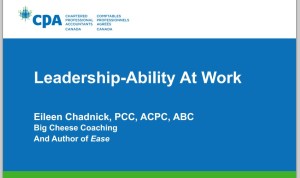CPA – Leadership-ability at work
Date: February 26, 2015
Name: CPA – Leadership-ability at work
There is an important competency that most leaders overlook is the ability to lead and develop others. Many aspiring and emerging leaders are required to have that certain skillset to enhance their success. This CPA webinar invites Eileen Chadnick, the principal of Big Cheese Coaching, to discuss the fundamental aptitude that leaders must have in the workforce. Eileen Chadnick is a certified coach that focuses on emotional intelligence, positive psychology and neuroscience to help clients achieve better success in their opportunities. With over 20 years of experience in communication, Eileen Chadnick owns her own communication consulting firm and serves over many financial businesses. Moreover, she won the international coach Federation Prism Award. This webinar will benefit many leaders who are looking for brush up on their leadership fundamental skills.
Eileen Chadnick believes leaders have the characteristic to be stood out and be exceptional in the crowd. They have the ability to develop opportunity in their personal development. There is a wide range of topic about leadership today and Chadnick indicates there are different paths for different leaders.
There are several paths to leadership. Some are more linear than others are; however, Chadnick emphasizes there is no path that will guarantee the future success. Instead, what leaders do on the path is what matters the most. People with job titles do not necessary mean they have leadership ability. In fact, leadership is a mindset and way of being. Many people do well but they have a lack of leadership. The length of experience does not equal to the level of leadership. Many leaders are new but they have signs of strong leadership skills. Moreover, Chadnick wants leaders to be careful with the assumptions and focus on the path pursuing leadership.
Chadnick believes leadership and learning are indispensable to each other. Leaders do not have all the answers. Leaders are learners, and many organizations foster leadership in any role. The important thing is self-assess and reflects.
Chadnick shows there are two parts of leadership: managing the work, and developing people. Managing the work means the skills that will align the job leaders have, and developing people is to increase the capacity to get the work done more efficiently. Chadnick indicates leaders need to have the balance between these two parts. Many leaders are one-sided and they need to ensure they are fulfill the necessary personal or professional competencies.
“More so in mindset, not title”
Chadnick has a list for leaders to distinguish the two parts of leadership.
| Managing | Leading |
| Budgets | Inspires / Enrolls / Engages |
| Assigns | Mentors / Coaches |
| Controls | Develops People |
| Focus on the Project | Instils / Role Model |
| Problem Solves | Vision / Direction |
| Might tell how | Empowers |
| Administers | Build on Competency |
| Accountable for Department |
Pitfalls and derailers
There are leaders who only concentrate on projects and deadlines. These will make the team tired. These leaders normally do not acknowledge or encourage others. In the end, people will leave.
When leaders see people as resources, they will miss the potential. They will minimize the teamwork performance and put themselves at risk, especially trust. Sometimes leaders only focus on their success, which will not share the success with other people. This will create a lack of trust from team players and people will not push themselves to the limit for these leaders.
Leaders who have a lack of awareness will influence others due to their leadership knowledge. Leadership starts with awareness. Leaders must be authentic and play their strengths to create trust with others.
Many leaders have the problem of delegating their jobs. This will create overload. Chadnick believes people who are doing too much are fear they will lose their presents in the team. Instead, leaders should find ways to give opportunities to others. Acknowledge and constructive feedbacks are significant. People will leave if they do not get effective feedbacks. People grow from feedbacks and feedbacks are a way to show them leaders are investing in them.
Impact and consequences
With poor leadership, Chadnick believes they will lose the engagement and retention level in the organization. People will not go extra miles for leaders. Moreover, sometimes leaders are not paying attention to the boundaries.
“Too much “them” than “us” is not good for “we””
Many leaders are struggling because they are not improving themselves. They should always ask themselves if there is better ways to improve the current situation.
Strategies to develop leadership-ability
Chadnick defines mindset is a set of beliefs or a way of thinking that determines one’s behavior, outlook and mental attitude. Leaders need to rethink their responsibilities from the managing part of the leadership and think a way to resituate the role. Leaders should learn to coach and mentor. This will help leaders to leverage team strengths. Leaders should always be a learner. They need to evolve their learning agenda continuously.
Leaders need to discover their authentic leadership. Chadnick designs five elements all leaders should know.
- Trust
- Know and use your strengths
- Integrity of your word
- Appropriate transparency
- Values driven actions
Leaders need to create resilience and momentum on the team. Leaders should know when to ask for help. Help stands for harness, exceptional, leadership, potential. Chadnick encourages all leaders to help grow their leaders’ leadership capacity. Furthermore, Leaders should have the right mindset, right skill set and the right tool set.

